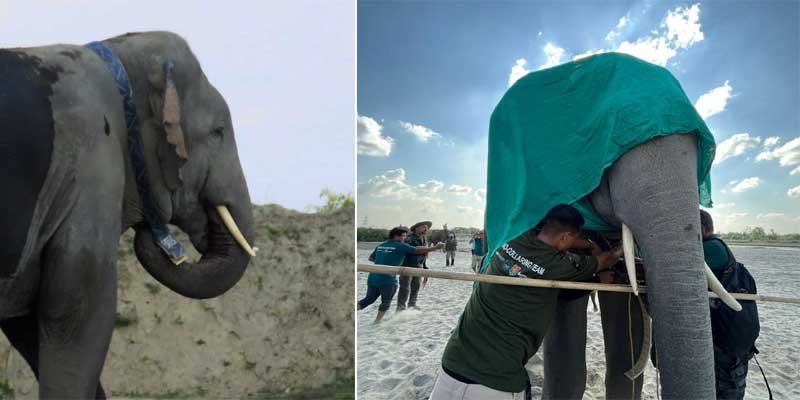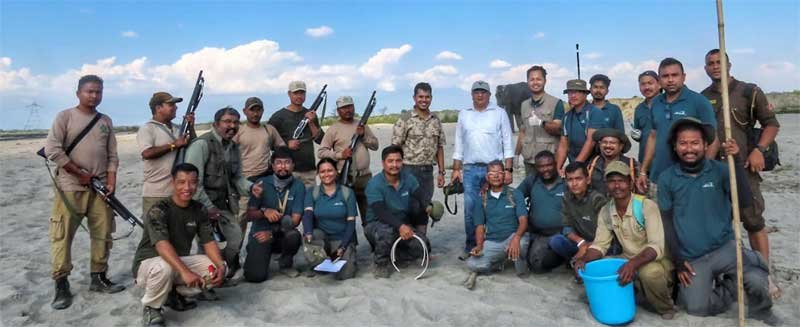Assam: Elephant radio collared in Baksa Forest
The elephant was tranquilised by a team of expert veterinarians with the help of forest officials and biologists......

GUWAHATI- A tusker from a herd of around 50 elephants was radio collared in Baksa district of Assam on November 18 mid-day as part of an ambitious initiative led by Assam Forest Department, and Baksa Forest Division, under Bodoland Territorial Region (BTR) of Assam with active support from District Administration and police, Baksa.
The elephant was tranquilised by a team of expert veterinarians with the help of forest officials and biologists under the leadership of Field Director of Manas Tiger Reserve Dr C. Ramesh, IFS and supervision of Golap Baniya, DFO, Baksa Forest Division at Jartaluk area of the district. The elephant later joined its herd.
Also Read- Manipur: Start ‘mass operation’ against Kuki militants- CM, MLAs tell Centre
The operation which was supported by SBI Foundation and Prof. Curtis Griffin of University of Massachusetts, USA, was facilitated by Aaranyak, a premier biodiversity conservation organisation of Northeast India.
“I had led a team of veterinarians from Assam State Zoo who supported the team with necessary veterinary support to capture and collar the elephant. We have supported the team with required medicines, tranquilizing guns and related items to make the radio collaring successful which will help in tracking the elephant movement to better manage human elephant conflict in the region”, said the DFO of Assam State Zoo Ashwini Kumar, IFS.
Also Read- Manipur Unrest: Cong demands Amit Shah resignation over Manipur violence
Lauding the effort, the Managing Director of the SBI Foundation Sanjay Prakash said, “The commendable efforts of the experts and team curated by the Assam Forest Department for the radio-collaring of elephants mark a significant milestone towards elephant conservation.
This achievement underscores the importance of fostering a multi-stakeholder approach to wildlife conservation across India. SBI Foundation extends heartfelt gratitude to the Government of Assam, the Assam Forest Department, all the dedicated experts and team members for their dedication to elephant conservation and improving approach in human-elephant conflict mitigation strategy in Assam. Congratulations to our implementing partner, Aaranyak on this achievement.”
Also Read- Manipur: Kuki groups to hold coffin rally to ‘pay tribute’ 10 slain youths
“The basic objective of radio collaring of wild elephants is to determine the elephant occupancy within an area or range. This helps us to work for better management of human elephant conflict and facilitate elephant conservation”, said Kaushik Barua, who was in the forefront of the radio-collaring operation.
“The team for capturing and radio collaring of the elephant also consisted of wildlife biologists, researchers, Green Globe, WWF India and local stakeholders. GPS-based satellite-radio telemetry collar which was fitted to the elephant will help to assess the migratory pattern, vegetative preferences of the wild elephant’s and the herd it belongs to. The locations provided by the collar will also act as an early alert system to help in better management of human-elephant conflict in the landscape”, said the Divisional Forest Officer of Baksa Forest Division Golap Baniya, AFS.

“The radio collaring of wild elephant will help understand ecology, habitat utilisation pattern, movement and occupancy in a more scientific way and help come out with better elephant conservation strategy in the landscape”, said Dr Bibhuti Prasad Lahkar, a Senior conservation scientist with Aaranyak and head of Elephant Research and Conservation Division (ERCD) of the organisation.
“A team of Aaranyak biologists comprising Hiten Kumar Baishya, Abhijit Boruah, Anushka Saikia and Dibakar Nayak have monitored the elephant from the last two months to make the radio collaring successful”, Dr Lahkar added.
The team of veterinarians comprised of Dr Bhaskar Choudhury of Wildlife Trust of India (WTI); Dr Prabhat Basumatary, Forest Veterinary Officer, Manas Tiger Reserve; Dr Debabrat Phukan, Forest Veterinary Officer, Assam State Zoo and it was assisted by technical team from the Assam State Zoo.









